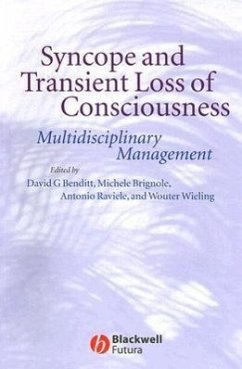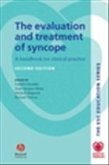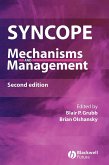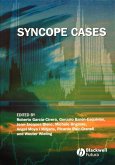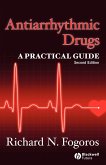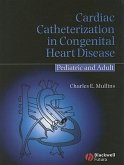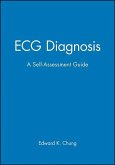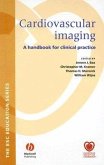BendittMultidisciplinary Management
Syncope and Transient Loss of Consciousness
Multidisciplinary Management
Herausgeber: Benditt, David G; Wieling, Wouter; Raviele, Antonio; Brignole, Michele
BendittMultidisciplinary Management
Syncope and Transient Loss of Consciousness
Multidisciplinary Management
Herausgeber: Benditt, David G; Wieling, Wouter; Raviele, Antonio; Brignole, Michele
- Broschiertes Buch
- Merkliste
- Auf die Merkliste
- Bewerten Bewerten
- Teilen
- Produkt teilen
- Produkterinnerung
- Produkterinnerung
Syncope is one of the most important causes of transient loss of consciousness, and is such a common event that it may be encountered by practitioners in virtually any field of medicine. As such, a broad spectrum of healthcare professionals may be involved in its assessment and management. Edited by distinguished individuals whose pioneering work in syncope highlights careers devoted to improving patient care, this book provides: - Succinct, practical and up-to-date guidance on the optimal clinical evaluation and treatment of patients with syncope and transient loss of consciousness in a…mehr
Andere Kunden interessierten sich auch für
![The Evaluation and Treatment of Syncope The Evaluation and Treatment of Syncope]() Benditt / ROWE / JohnsonThe Evaluation and Treatment of Syncope120,99 €
Benditt / ROWE / JohnsonThe Evaluation and Treatment of Syncope120,99 €![Syncope Syncope]() Grubb B.P. Blair / Olshansky B. BrianSyncope169,99 €
Grubb B.P. Blair / Olshansky B. BrianSyncope169,99 €![Syncope Cases Syncope Cases]() Roberto Garcia-CiveraSyncope Cases114,99 €
Roberto Garcia-CiveraSyncope Cases114,99 €![Antiarrhythmic Drugs Antiarrhythmic Drugs]() Richard N FogorosAntiarrhythmic Drugs113,99 €
Richard N FogorosAntiarrhythmic Drugs113,99 €![Cardiac Catheterization in Congenital Heart Disease Cardiac Catheterization in Congenital Heart Disease]() Charles E MullinsCardiac Catheterization in Congenital Heart Disease388,99 €
Charles E MullinsCardiac Catheterization in Congenital Heart Disease388,99 €![ECG Diagnosis ECG Diagnosis]() Edward K ChungECG Diagnosis82,99 €
Edward K ChungECG Diagnosis82,99 €![Cardiovascular Imaging Cardiovascular Imaging]() Bax J Jeroen / Kramer M Christpher / Marwick H ThomasCardiovascular Imaging188,99 €
Bax J Jeroen / Kramer M Christpher / Marwick H ThomasCardiovascular Imaging188,99 €-
-
-
Syncope is one of the most important causes of transient loss of consciousness, and is such a common event that it may be encountered by practitioners in virtually any field of medicine. As such, a broad spectrum of healthcare professionals may be involved in its assessment and management. Edited by distinguished individuals whose pioneering work in syncope highlights careers devoted to improving patient care, this book provides: - Succinct, practical and up-to-date guidance on the optimal clinical evaluation and treatment of patients with syncope and transient loss of consciousness in a multidisciplinary framework - Evidence-based recommendations founded on comprehensive literature review and extensive clinical experience by expert contributors - Meaningful clinical tips for appropriate use of guidelines in clinical practice - Key recent citations Building on the European Society of Cardiology Syncope Guidelines, this book provides a clear evaluation of the latest recommendations for care of patients with syncope and transient loss of consciousness, with a multidisciplinary focus that makes it equally relevant for general physicians or those specializing in cardiology or neurology.
Hinweis: Dieser Artikel kann nur an eine deutsche Lieferadresse ausgeliefert werden.
Hinweis: Dieser Artikel kann nur an eine deutsche Lieferadresse ausgeliefert werden.
Produktdetails
- Produktdetails
- Verlag: Wiley
- Seitenzahl: 208
- Erscheinungstermin: 1. Januar 2008
- Englisch
- Abmessung: 228mm x 156mm x 11mm
- Gewicht: 381g
- ISBN-13: 9781405176255
- ISBN-10: 1405176253
- Artikelnr.: 22953956
- Herstellerkennzeichnung
- Libri GmbH
- Europaallee 1
- 36244 Bad Hersfeld
- gpsr@libri.de
- Verlag: Wiley
- Seitenzahl: 208
- Erscheinungstermin: 1. Januar 2008
- Englisch
- Abmessung: 228mm x 156mm x 11mm
- Gewicht: 381g
- ISBN-13: 9781405176255
- ISBN-10: 1405176253
- Artikelnr.: 22953956
- Herstellerkennzeichnung
- Libri GmbH
- Europaallee 1
- 36244 Bad Hersfeld
- gpsr@libri.de
David G Benditt, M.D., FACC, FRCP(C), FHRS David G. Benditt, M.D. was born in Winnipeg, Canada. He received a B.Sc. degree in Electrical Engineering and an MD degree from the University of Manitoba. Following completion of postgraduate training in Internal Medicine, he moved to Duke University Medical Center in Durham, North Carolina where he completed a fellowship training in cardiology and cardiac electrophysiology. Thereafter, Dr Benditt joined the faculty of the Cardiovascular Division in the Dept of Medicine at the University of Minnesota where he established its training and research program in clinical cardiac electrophysiology Dr. Benditt is currently Professor of Medicine and Co-director of the Cardiac Arrhythmia Center at the University of Minnesota in Minneapolis. He has been an Established Investigator of the American Heart Association, and President of both the American Heart Association-Minnesota Affiliate and the North American Society for Pacing and Electrophysiology (NASPE). Dr Benditt has recently been honored with the Pioneer in Pacing and Electrophysiology Award of the Heart Rhythm Society. He is a Fellow of both the American College of Cardiology, the Royal College of Physicians and Surgeons of Canada, and the Heart Rhythm Society (HRS). He is a member of the European Heart Rhythm Association (EHRA), and of the Council of Presidents of HRS. He is an associate editor of the Journal of Interventional Electrophysiology (JICE), and is a member of the Editorial Board of Europace. He has been a member of the Editorial Board of the Journal of the American College of Cardiology (JACC), The Journal of Cardiac Electrophysiology, and the American Journal of Cardiology (AJC). He has participated in many professional society Guidelines and Consensus reports, most recently the Syncope guidelines of the European Society of Cardiology. He is a medical consultant to the US Federal Aviation administration on evaluation of individuals with transient loss of consciousness, as well as to several medical device manufacturers. His principal research interests are directed toward the fields of autonomic control as it applies to syncope (fainting), and implantable and external devices for cardiac rhythm management. Michele Brignole, MD FESC From 1996, he is the chief of the Department of Cardiology of Ospedali del Tigullio, Lavagna, Italy. He is Fellow of the European Society of Cardiology. He was the chairman of the Task Force on Syncope of the European Society of Cardiology. He is currently the President of AIAC, Associazione Italiana di Aritmologia e Cardiostimolazione. The main research field has been diagnosis, pathophysiology and therapy of syncope and rhythm disturbances and radiofrequency catheter ablation of arrhythmias; he has published: - 164 original papers currently quoted on Medline; he was first name in 75 of them. Antonio Raviele, MD, FESC Graduated with honors in Medicine and Surgery at Universita' degli Studi di Napoli of University of Napoli in 1971 Specialized in Cardiology at Florence University in 1974 Since 1995 Chief of the Cardiology Division and since 2000 Chief of the Cardiovascular Department of the Umberto I Hospital of Venice-Mestre , Italy From 2000 to 2004 President of AIAC, Italian Association of Arrhythmology and Cardiac Pacing; from 2004 to 2006 Past-President of the same Association Founding Father and current General Secretary of ECAS, European Cardiac Arrhythmia Society Fellow of the European Society of Cardiology and fellow of the Heart Ryhtm Society W. Wieling. MD, PhD Scientific and professional experience 1984- present. Head research group physiology and pathophysiology of the circulation of the Cardiovascular Research Institute of the AMC. This research group is a collaboration of clinicians, physiologists and engineers and its main interest is research on the short-term regulation of the circulation using non-invasive technologies. 1994- present associate professor Department of Internal Medicine, director syncope unit Academic Medical Centre 1999- 2004 member of the Executive Committtee of the European Society of Cardiology Task Force on Syncope Major areas of research interest 1. Autonomic nervous system control of the circulation in health and disease 2. Physiological strategies to improve orthostatic intolerance 3. Evaluation and treatment of syncope
Contributors.
Preface.
Part 1 Syncope and TLOC overview.
1 Definition and classification of syncope and transient.
loss of consciousness.
Jean-Jacques Blanc.
2 Epidemiologic aspects of transient loss of consciousness/syncope.
Robert S Sheldon, Anna Serletis.
3 Pathophysiology of syncope: postural, neurally-mediated,.
and arrhythmic.
W Wieling.
4 Cerebral perfusion in syncope.
J Gert van Dijk, Roland D Thijs.
5 Risk stratification-impact on diagnostic strategy.
Brian Olshansky.
Part 2 Clinical evaluation strategies.
6 Value and limitations of clinical history in assessing cause of syncope.
Paolo Alboni, Maurizio Dinelli.
7 Emergency department evaluation of transient loss of consciousness/.
syncope.
Franc¿ois P Sarasin.
8 The essential autonomic assessment for evaluating the.
cause of syncope.
Carlos A Morillo, Juan C Guzman.
9 Neurally-mediated reflex syncope: recognition by history and.
clinical testing.
Anna Serletis, Robert S Sheldon.
10 Value and limitations of ambulatory electrocardiographic monitoring.
Andrew D Krahn.
11 Recording ambulatory blood pressure in the syncope and.
TLOC evaluation.
Dietrich Andresen.
12 Electrophysiologic testing: value and limitations in the transient loss
of.
consciousness/syncope evaluation.
Suneet Mittal.
13 Intolerance to upright posture in autonomic failure and the postural.
tachycardia syndrome: assessment and treatment strategies.
Christopher J Mathias.
14 Improving tolerance to upright posture: current status of tilt-training.
and other physical maneuvers.
Hugo Ector, Tony Reybrouck.
15 Syncope in patients with bundle-branch block and other conduction.
system abnormalities.
Angel Moya.
Part 3 Specific conditions.
16 Treatment strategies in neurally-mediated reflex syncope: effectiveness
of.
drugs, pacing, and physical maneuvers.
Richard Sutton.
17 Structural heart disease, syncope, and risk of sudden death: selection
of.
patients for implantable cardioverter-defibrillator therapy.
Kathy L Lee, Hung-Fat Tse, Chu-Pak Lau.
18 Channelopathies as a cause of syncope.
T Boussy, Pedro Brugada.
19 Distinguishing seizures and pseudosyncope from syncope.
Adam P Fitzpatrick.
20 Syncope and transient loss of consciousness in children and
adolescents:.
congenital and acquired conditions.
Hugh Calkins.
21 Transient loss of consciousness, syncope, and falls in the elderly.
Rose Anne Kenny.
22 Drug-induced (iatrogenic) syncope.
Gerald V Naccarelli.
Part 4 Economic and research aspects.
23 Syncope and the competitive athlete: recommendations for evaluation.
and permission to compete.
Franco Giada, Antonio Raviele (Ospedale Umberto I).
24 Role of syncope management units.
Win K Shen, Michele Brignole (Ospedali del Tigullio).
25 The impact of syncope and transient loss of consciousness on.
quality of life.
Blair P Grubb.
Part 5 Current controversies and future directions.
26 Driving and flying restrictions for the syncope and/or implanted.
cardiac device patient.
Christina M Murray, Dwight W Reynolds.
27 Clinical trials landscape: what's new, what's ongoing, what do.
we need.
Michele Brignole (Ospedali del Tigullio), David G Benditt (University of
Minnesota Medical School), Wouter Wieling (Academic Medical Centre).
28 Syncope and transient loss of consciousness: multidisciplinary.
management.
A John Camm.
29 Syncope practice guidelines initiative.
David G Benditt (University of Minnesota Medical School).
Appendix: syncope consortium members.
Index
Preface.
Part 1 Syncope and TLOC overview.
1 Definition and classification of syncope and transient.
loss of consciousness.
Jean-Jacques Blanc.
2 Epidemiologic aspects of transient loss of consciousness/syncope.
Robert S Sheldon, Anna Serletis.
3 Pathophysiology of syncope: postural, neurally-mediated,.
and arrhythmic.
W Wieling.
4 Cerebral perfusion in syncope.
J Gert van Dijk, Roland D Thijs.
5 Risk stratification-impact on diagnostic strategy.
Brian Olshansky.
Part 2 Clinical evaluation strategies.
6 Value and limitations of clinical history in assessing cause of syncope.
Paolo Alboni, Maurizio Dinelli.
7 Emergency department evaluation of transient loss of consciousness/.
syncope.
Franc¿ois P Sarasin.
8 The essential autonomic assessment for evaluating the.
cause of syncope.
Carlos A Morillo, Juan C Guzman.
9 Neurally-mediated reflex syncope: recognition by history and.
clinical testing.
Anna Serletis, Robert S Sheldon.
10 Value and limitations of ambulatory electrocardiographic monitoring.
Andrew D Krahn.
11 Recording ambulatory blood pressure in the syncope and.
TLOC evaluation.
Dietrich Andresen.
12 Electrophysiologic testing: value and limitations in the transient loss
of.
consciousness/syncope evaluation.
Suneet Mittal.
13 Intolerance to upright posture in autonomic failure and the postural.
tachycardia syndrome: assessment and treatment strategies.
Christopher J Mathias.
14 Improving tolerance to upright posture: current status of tilt-training.
and other physical maneuvers.
Hugo Ector, Tony Reybrouck.
15 Syncope in patients with bundle-branch block and other conduction.
system abnormalities.
Angel Moya.
Part 3 Specific conditions.
16 Treatment strategies in neurally-mediated reflex syncope: effectiveness
of.
drugs, pacing, and physical maneuvers.
Richard Sutton.
17 Structural heart disease, syncope, and risk of sudden death: selection
of.
patients for implantable cardioverter-defibrillator therapy.
Kathy L Lee, Hung-Fat Tse, Chu-Pak Lau.
18 Channelopathies as a cause of syncope.
T Boussy, Pedro Brugada.
19 Distinguishing seizures and pseudosyncope from syncope.
Adam P Fitzpatrick.
20 Syncope and transient loss of consciousness in children and
adolescents:.
congenital and acquired conditions.
Hugh Calkins.
21 Transient loss of consciousness, syncope, and falls in the elderly.
Rose Anne Kenny.
22 Drug-induced (iatrogenic) syncope.
Gerald V Naccarelli.
Part 4 Economic and research aspects.
23 Syncope and the competitive athlete: recommendations for evaluation.
and permission to compete.
Franco Giada, Antonio Raviele (Ospedale Umberto I).
24 Role of syncope management units.
Win K Shen, Michele Brignole (Ospedali del Tigullio).
25 The impact of syncope and transient loss of consciousness on.
quality of life.
Blair P Grubb.
Part 5 Current controversies and future directions.
26 Driving and flying restrictions for the syncope and/or implanted.
cardiac device patient.
Christina M Murray, Dwight W Reynolds.
27 Clinical trials landscape: what's new, what's ongoing, what do.
we need.
Michele Brignole (Ospedali del Tigullio), David G Benditt (University of
Minnesota Medical School), Wouter Wieling (Academic Medical Centre).
28 Syncope and transient loss of consciousness: multidisciplinary.
management.
A John Camm.
29 Syncope practice guidelines initiative.
David G Benditt (University of Minnesota Medical School).
Appendix: syncope consortium members.
Index
Contributors.
Preface.
Part 1 Syncope and TLOC overview.
1 Definition and classification of syncope and transient.
loss of consciousness.
Jean-Jacques Blanc.
2 Epidemiologic aspects of transient loss of consciousness/syncope.
Robert S Sheldon, Anna Serletis.
3 Pathophysiology of syncope: postural, neurally-mediated,.
and arrhythmic.
W Wieling.
4 Cerebral perfusion in syncope.
J Gert van Dijk, Roland D Thijs.
5 Risk stratification-impact on diagnostic strategy.
Brian Olshansky.
Part 2 Clinical evaluation strategies.
6 Value and limitations of clinical history in assessing cause of syncope.
Paolo Alboni, Maurizio Dinelli.
7 Emergency department evaluation of transient loss of consciousness/.
syncope.
Franc¿ois P Sarasin.
8 The essential autonomic assessment for evaluating the.
cause of syncope.
Carlos A Morillo, Juan C Guzman.
9 Neurally-mediated reflex syncope: recognition by history and.
clinical testing.
Anna Serletis, Robert S Sheldon.
10 Value and limitations of ambulatory electrocardiographic monitoring.
Andrew D Krahn.
11 Recording ambulatory blood pressure in the syncope and.
TLOC evaluation.
Dietrich Andresen.
12 Electrophysiologic testing: value and limitations in the transient loss
of.
consciousness/syncope evaluation.
Suneet Mittal.
13 Intolerance to upright posture in autonomic failure and the postural.
tachycardia syndrome: assessment and treatment strategies.
Christopher J Mathias.
14 Improving tolerance to upright posture: current status of tilt-training.
and other physical maneuvers.
Hugo Ector, Tony Reybrouck.
15 Syncope in patients with bundle-branch block and other conduction.
system abnormalities.
Angel Moya.
Part 3 Specific conditions.
16 Treatment strategies in neurally-mediated reflex syncope: effectiveness
of.
drugs, pacing, and physical maneuvers.
Richard Sutton.
17 Structural heart disease, syncope, and risk of sudden death: selection
of.
patients for implantable cardioverter-defibrillator therapy.
Kathy L Lee, Hung-Fat Tse, Chu-Pak Lau.
18 Channelopathies as a cause of syncope.
T Boussy, Pedro Brugada.
19 Distinguishing seizures and pseudosyncope from syncope.
Adam P Fitzpatrick.
20 Syncope and transient loss of consciousness in children and
adolescents:.
congenital and acquired conditions.
Hugh Calkins.
21 Transient loss of consciousness, syncope, and falls in the elderly.
Rose Anne Kenny.
22 Drug-induced (iatrogenic) syncope.
Gerald V Naccarelli.
Part 4 Economic and research aspects.
23 Syncope and the competitive athlete: recommendations for evaluation.
and permission to compete.
Franco Giada, Antonio Raviele (Ospedale Umberto I).
24 Role of syncope management units.
Win K Shen, Michele Brignole (Ospedali del Tigullio).
25 The impact of syncope and transient loss of consciousness on.
quality of life.
Blair P Grubb.
Part 5 Current controversies and future directions.
26 Driving and flying restrictions for the syncope and/or implanted.
cardiac device patient.
Christina M Murray, Dwight W Reynolds.
27 Clinical trials landscape: what's new, what's ongoing, what do.
we need.
Michele Brignole (Ospedali del Tigullio), David G Benditt (University of
Minnesota Medical School), Wouter Wieling (Academic Medical Centre).
28 Syncope and transient loss of consciousness: multidisciplinary.
management.
A John Camm.
29 Syncope practice guidelines initiative.
David G Benditt (University of Minnesota Medical School).
Appendix: syncope consortium members.
Index
Preface.
Part 1 Syncope and TLOC overview.
1 Definition and classification of syncope and transient.
loss of consciousness.
Jean-Jacques Blanc.
2 Epidemiologic aspects of transient loss of consciousness/syncope.
Robert S Sheldon, Anna Serletis.
3 Pathophysiology of syncope: postural, neurally-mediated,.
and arrhythmic.
W Wieling.
4 Cerebral perfusion in syncope.
J Gert van Dijk, Roland D Thijs.
5 Risk stratification-impact on diagnostic strategy.
Brian Olshansky.
Part 2 Clinical evaluation strategies.
6 Value and limitations of clinical history in assessing cause of syncope.
Paolo Alboni, Maurizio Dinelli.
7 Emergency department evaluation of transient loss of consciousness/.
syncope.
Franc¿ois P Sarasin.
8 The essential autonomic assessment for evaluating the.
cause of syncope.
Carlos A Morillo, Juan C Guzman.
9 Neurally-mediated reflex syncope: recognition by history and.
clinical testing.
Anna Serletis, Robert S Sheldon.
10 Value and limitations of ambulatory electrocardiographic monitoring.
Andrew D Krahn.
11 Recording ambulatory blood pressure in the syncope and.
TLOC evaluation.
Dietrich Andresen.
12 Electrophysiologic testing: value and limitations in the transient loss
of.
consciousness/syncope evaluation.
Suneet Mittal.
13 Intolerance to upright posture in autonomic failure and the postural.
tachycardia syndrome: assessment and treatment strategies.
Christopher J Mathias.
14 Improving tolerance to upright posture: current status of tilt-training.
and other physical maneuvers.
Hugo Ector, Tony Reybrouck.
15 Syncope in patients with bundle-branch block and other conduction.
system abnormalities.
Angel Moya.
Part 3 Specific conditions.
16 Treatment strategies in neurally-mediated reflex syncope: effectiveness
of.
drugs, pacing, and physical maneuvers.
Richard Sutton.
17 Structural heart disease, syncope, and risk of sudden death: selection
of.
patients for implantable cardioverter-defibrillator therapy.
Kathy L Lee, Hung-Fat Tse, Chu-Pak Lau.
18 Channelopathies as a cause of syncope.
T Boussy, Pedro Brugada.
19 Distinguishing seizures and pseudosyncope from syncope.
Adam P Fitzpatrick.
20 Syncope and transient loss of consciousness in children and
adolescents:.
congenital and acquired conditions.
Hugh Calkins.
21 Transient loss of consciousness, syncope, and falls in the elderly.
Rose Anne Kenny.
22 Drug-induced (iatrogenic) syncope.
Gerald V Naccarelli.
Part 4 Economic and research aspects.
23 Syncope and the competitive athlete: recommendations for evaluation.
and permission to compete.
Franco Giada, Antonio Raviele (Ospedale Umberto I).
24 Role of syncope management units.
Win K Shen, Michele Brignole (Ospedali del Tigullio).
25 The impact of syncope and transient loss of consciousness on.
quality of life.
Blair P Grubb.
Part 5 Current controversies and future directions.
26 Driving and flying restrictions for the syncope and/or implanted.
cardiac device patient.
Christina M Murray, Dwight W Reynolds.
27 Clinical trials landscape: what's new, what's ongoing, what do.
we need.
Michele Brignole (Ospedali del Tigullio), David G Benditt (University of
Minnesota Medical School), Wouter Wieling (Academic Medical Centre).
28 Syncope and transient loss of consciousness: multidisciplinary.
management.
A John Camm.
29 Syncope practice guidelines initiative.
David G Benditt (University of Minnesota Medical School).
Appendix: syncope consortium members.
Index

